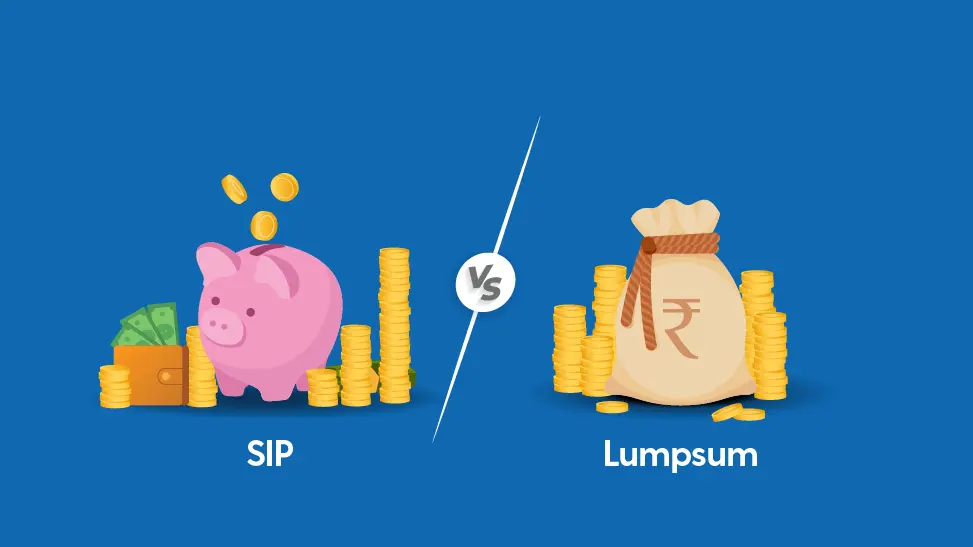- Home
- Blog
- Mutual Funds
- Difference Between SIP And Lumpsum
- Difference Between SIP And Lumpsum
Difference Between SIP And Lumpsum

- Published Date: July 22, 2024
- Updated Date: June 17, 2025
- By Team Choice
‘SIP vs. Lumpsum: which is better?’ is a popular debate topic amongst investors looking to invest their money in mutual funds. It is significant for you to know that each of the mentioned methods caters to different financial needs and market conditions.
This blog will help you learn the differences between SIP and lumpsum investments to help you choose the right strategy for your financial goals.
What is a SIP?
A Systematic Investment Plan (SIP) is an investment strategy where you invest a fixed amount of money at regular intervals into a mutual fund scheme. This systematic approach allows you to build a corpus over time without investing a large amount of money upfront.
What is a Lumpsum Investment?
A lumpsum investment involves investing a substantial amount of money at once into a mutual fund or any other investment avenue. This approach requires a one-time commitment and is often chosen when an investor has a significant amount of capital ready for investment.
Understanding the differences between both investment strategies, SIPs or Lumpsum investments, can help you decide which one is best suited for you.
SIP vs. Lumpsum: A Comparative Analysis
Here’s a quick overview of the differences between a SIP and a lumpsum investment:
Investment Factors | SIP (Systematic Investment Plan) | Lumpsum |
Strategy | Involves investing a fixed amount at regular intervals | Involves investing a substantial amount at once |
Goals | Long-term goals | Short-term goals |
Risks | Lower risks | Higher risks |
Returns | Moderate to high returns (power of compounding) | Potential for higher returns (solely depends on market conditions) |
Market Conditions | Ideal for volatile markets | Beneficial in a bull market |
Flexibility | High flexibility | Low flexibility |
Market Timing | Not required | Highly required |
Cost Averaging | Benefits of rupee cost averaging | No benefits of rupee cost averaging |
Investment Strategy:
- SIP: SIPs involve investing a fixed amount at regular intervals, promoting disciplined investing without the need for a larger upfront sum. But the question arises how to invest in sip.
- Lumpsum: Lumpsum investments involve investing a huge sum of money at one go, requiring a significant initial investment capital commitment.
Investment Goals:
- SIP: SIPs are ideal for achieving long-term investment goals, such as retirement planning or children’s education, due to the benefits of regular, consistent investment.
- Lumpsum: Lumpsum investments are suitable for achieving short-term goals, making the most of available substantial capital.
Investment Risks:
- SIP: SIPs involve lower risks due to the rupee cost averaging, which mitigates the risk of market volatility over time.
- Lumpsum: Lumpsum investments involve high risks as the entire capital is exposed to market fluctuations from the moment of investment, especially if invested at market peak.
Investment Returns:
- SIP: SIPs offer moderate to high returns over time through the power of compounding and consistent investments.
- Lumpsum: Lumpsum investments may potentially provide higher returns, solely depending on market conditions at the time of investment.
Market Conditions:
- SIP: SIPs are ideal for volatile markets where regular investments can smooth out fluctuations and potentially lower the average costs of units purchased.
- Lumpsum: Lumpsum investments are beneficial in bullish markets where immediate exposure to market growth can maximise returns, assuming favourable market conditions.
Investment Flexibility:
- SIP: SIPs are flexible as they allow to start with small amounts and increase investments gradually as financial capability improves.
- Lumpsum: Lumpsum investments provide low flexibility as they require substantial upfront capital, limiting the ability to adjust investments.
Market Timing:
- SIP: In SIPs, timing the market is not critical as investments are made regularly, regardless of market conditions, reducing the need to predict market highs and lows.
- Lumpsum: In Lumpsum investments, timing the market is required as the entire investment amount is deployed at once, potentially impacting returns significantly based on market timing.
Cost Averaging:
- SIP: Investing through SIPs can help you benefit from rupee cost averaging, which helps average out the costs of investments over time.
- Lumpsum: There are no benefits of rupee cost averaging in lumpsum investments as the entire investment is made at one point in time.
Essential Factors to Consider Before Investing: Make Informed Decisions
Before making any mutual fund investment decisions, it is important to consider several factors to ensure you are making informed choices:
- Financial Goals: Ensure you define both short-term and long-term goals as it will majorly influence your investment strategy.
- Risk Tolerance: Assess how comfortable you are with market fluctuations and potential losses as different investment options carry varying levels of risk.
- Investment Horizon: Determine how long you can invest your money before needing it as a longer investment horizon has the potential for higher returns.
- Market Conditions: Stay informed about current market trends and economic conditions as timing your investments based on market cycles may impact your returns.
- Tax Implications: Understand the tax implications of your investments as different types of investments are taxed differently.
- Performance of the Fund: Examine the historical performance and track record of the mutual funds or securities to gauge the potential for future growth.
Reviewing all of these factors can help you gain a clear understanding of whether an SIP or lumpsum investment strategy is suited for you.
SIP or Lumpsum: Which Investment Strategy is Right For You?
Choosing between SIP and lumpsum investments depends on your financial goals, risk tolerance, and market outlook:
SIP:
Systematic Investment Plannings (SIPs) are ideal for investors looking for disciplined, long-term wealth creation with lower risk exposure and the benefit of rupee cost averaging. Suitable for individuals with regular income and long-term financial goals like retirement planning or wealth accumulation.
Lumpsum:
Lumpsum investments are generally preferred by investors with substantial amounts of capital ready for investment, seeking potentially higher returns in bullish market conditions. This approach is best when market timing is favourable or expecting immediate market growth, such as windfall or lumpsum receipts.
Select the strategy that best aligns with your financial situation, investment horizon, and comfort level with market fluctuations.
Final Thoughts
Both SIP and lumpsum investment have their own set of advantages and are suited for different financial scenarios. The key is to understand your financial goals, risk tolerance, and market conditions to make an informed decision. Whether you choose SIP, lumpsum, or a combination of both, the most important aspect is to stay committed to your investment strategy and regularly review your investment portfolio.
Investing is a journey, and with the right strategy and approach, you can achieve your financial aspirations and secure your future.
Recommended for you

FII DII Data - Live Data

Share Market Prediction For Tomorrow

Market Prediction Today (02th March 2026)
